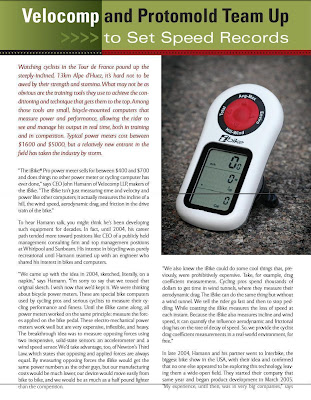
I've often read that some of the most creative ideas that turned into winning products were first sketched out on table napkins. The iBike Power Computer was no exception either back in 2004, according to John Hamann, CEO/engineer of Velocomp LLP - a sports technology company based in Ennis, Montana.
The iBike computer is quite different from others. Affording portability and lighter weight to its user, it churns out an impressive array of readings from power, wind speed, road inclination, aerodynamic drag and even frictional losses in your bicycle's drive train by applying Newton's Third Law with the help of two inexpensive solid state sensors - an accelerometer and a wind speed sensor (also called an anemometer).

Velocomp consulted Protomold, a company specializing in automated Rapid Injection Molding for prototypes and commercial products.
Plastic injection molding uses plastic in the form of resin pellets that are loaded into the hopper of an injection-molding machine. A heated barrel on the machine melts the material and a large screw forces the melt into the mold. The material cools and solidifies. The machine then opens the mold at its parting line and ejector pins push out the part.
Rapid Injection Molding automates the design and manufacturing of molds based on 3D CAD models that have been uploaded online. This automation typically cuts lead times for initial parts to one-third that of conventional methods. Naturally, cost savings vary with the number of parts being produced, but rapid injection molding can have a substantial cost advantage in runs of up to thousands of parts.

 Protomold produces quality molds using advanced aluminum alloys and precise, high-speed CNC machining. Parts can be molded in almost any engineering grade resin, at substantial cost savings compared to conventional prototyping and production methods.
Protomold produces quality molds using advanced aluminum alloys and precise, high-speed CNC machining. Parts can be molded in almost any engineering grade resin, at substantial cost savings compared to conventional prototyping and production methods.Protomold provides us a case study of the design challenges faced by Velocomp and how they went about assisting them in creating a finanically feasable solution. One of the highlights of this partnership is the following statement from the case study:
"Protomold has been an important part not just of the iBike’s success, but of the business venture as well. With a partner like Protomold, we don’t just offer a better product; we can also change the way we do business as well. We may be small, but we’re doing the same thing that some of the best companies do: turning raw materials into cash faster than the raw material bills come due. We could wait 12 weeks for large orders of parts to ship from China, but instead, we keep a very small inventory and get parts as we need them from Protomold and our other US suppliers, which lets us be both fast to market and cash flow positive at a very early stage.”
Read the case study here or for actual PDFs, click here, and here (all courtesy of Protomold):





6 comments:
If I had a choice between PT and iBike, I'd definitely pick the latter just because of the tons of features it offers. Really unmatched in the market today. I'm waiting to see what the Quark system comes up with.
I think they're already begun selling Quarks. The other day I had a look at their handlebar mounted computer. Man its huge!
Low cost is no alleviating factor for inaccurate power readings on the iBike.
It may be inaccurate, but it is just plain ugly. It doesn't have the svelte look of a top notch cycling product. Just my opinion.
The ibike does not work accurately during acceleration spikes and decreases, and during drafting.
What's really cool about these units that they are upgradeable via firmware, so you don't have to buy a completely new unit if you want the extra goodies! Chceck it out: http://www.cogswappr.com/wp-admin/post.php?action=edit&post=215
The lowest model is supposedly going to retail for only $199. Has anyone compared the data to a powertap or SRM?
Post a Comment